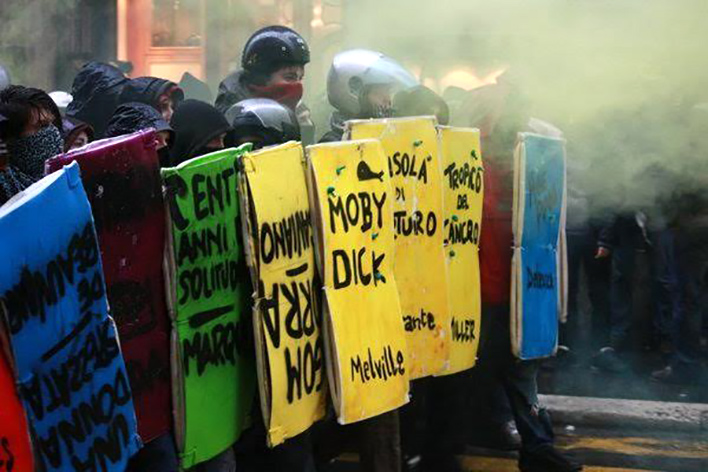Miss Jean Brodie and those of her kind: cattivi maestri nell’età dei totalitarismi
Abstract
L'intervento vuol contribuire a un'indagine sui rapporti tra insegnamento scolastico e politica attraverso l'indagine su un personaggio specifico: l’insegnante che mette in atto una consapevole strategia di manipolazione psicologica dei propri studenti per imporre loro una visione totalitaria, o comunque coerente con una ideologia di tipo fascista. L'indagine si sviluppa attraverso l'analisis di tre testi-campione ambientati nel periodo che ha preceduto o accompagnato l’affermazione dei regimi totalitari del Novecento.Downloads
Riferimenti bibliografici
Arendt, Hannah, Le origini del totalitarismo (1951), Torino, Einaudi, 2009.
Bandini, Bruno V. – Pizzolini, Mirella, Scuola e pedagogia nella Germania nazista, Torino, Loescher, 1981.
Bini, Giorgio, “Romanzi e realtà di maestri e maestre”, Storia d’Italia – Annali 4: Intellettuali e potere, Torino, Einaudi, Ed. Corrado Vivanti, 1981: 1195-1224.
Brown, Peter Robert, “There’s Something about Mary”: Narrative and Ethics in The Prime of Miss Jean Brodiei”, Journal of Narrative Theory, XXXVI. 2 (2006): 228-253.
D’Ambrosio, Elena, A scuola col duce. L’istruzione primaria nel ventennio fascista, Como, Istituto di Storia Contemporanea, 2001.
Dickson, Beth, “«Pathetic Reminders»? The Idea of Education in Modern Scottish Fiction”, Ethically Speaking: Voice and Values in Modern Scottish Writing, Eds. James McGonigal – Kirsten Stirling, Amsterdam-New York, Rodopi, 2006.
Dorenkamp, J.H., “Moral Vision in Muriel Spark’s The Prime of Miss Jean Brodie”, Renascence, XXXIII. 1 (1980): 3-9.
Firda, Richard Arthur, All Quiet on the Western Front: Literary Analysis and Cultural Context, New York, Twayne, 1993.
Galimberti, Fabio, “La macchina della rimozione”, Forme contemporanee del totalitarismo, Ed. Massimo Recalcati, Torino, Bollati Boringhieri, 2007: 263-277.
Glenn, Charles, Contrasting Models of State and School: a Comparative Historical Study of Parental Choice and State Control, New York-London, Continuum, 2011.
Goddard, Michael, Gombrowicz, Polish Modernism, and the Subversion of Form, West Lafayette, Purdue University Press, 2010.
Gombrowicz, Witold, Ferdydurke (1937), Milano, Feltrinelli, 2005.
Hofer, Walther, Il Nazionalsocialismo. Documenti 1933-1945, Milano, Feltrinelli, 1964.
Kats, Michael S., “The Role of Trustworthiness in Teaching: An Examination of The Prime of Miss Jean Brodie”, Studies in Philosophy and Education, XXXIII. 6 (2014): 621-633.
Keroes, Jo, Tales Out of School: Gender, Longing, and the Teacher in Fiction and Film, Carbondale, Southern Illinois University Press, 1999.
Maida, Bruno – Rolfi, Aldo, Il futuro spezzato: i nazisti contro i bambini, Firenze, La Giuntina, 1997.
Meneghello, Luigi, I fiori italiani (1976), Milano, Rizzoli, 1992.
Norris, Margot, Writing War in the Twentieth Century, Charlottesville, University Press of Virginia, 2000.
Olschki, Marcella, Terza liceo 1939 (1954), Pref. di Pietro Calamandrei, Palermo, Sellerio, 1993.
Piscopo, Ugo, La scuola del regime: i libri di testo nelle scuole secondarie sotto il fascismo, Napoli, Guida, 2006.
Recalcati, Massimo, L’ora di lezione. Per un’erotica dell’insegnamento, Torino, Einaudi, 2014.
Remarque,Erich Maria, Im Westen nicht Neues (1929), trad. it. Niente di nuovo sul fronte occidentale, Milano, Mondadori, 1989.
Santoni Rugiu, Antonio – Santamaita, Saverio, Il professore nella scuola italiana dall’Ottocento a oggi, Roma-Bari, Laterza, 2011.
Schiavo, Gianluca, Dal signor maestro al prof in crisi. L’insegnante di scuola attraverso la letteratura italiana contemporanea, Roma, Armando, 2013.
Spark, Muriel, The Prime of Miss Jean Brodie (1961), New York, HarperCollins, 2009.
Suh, Judy, “The Familiar Attractions of Fascism in Muriel Spark’s The Prime of Miss Jean Brodie”, Journal of Modern Literature, XXX.2 (2007): 86-102.
Informazioni sul copyright
Questa licenza permette a terzi di riprodurre, distribuire, comunicare al pubblico, esporre in pubblico, rappresentare, eseguire, recitare e modificare quest'opera, purché vengano citati l'autore e la rivista. Questa è la più ampia tra le licenze Creative Commons, rispetto alle libertà concesse a terzi sulle opere licenziate sotto Attribuzione.









